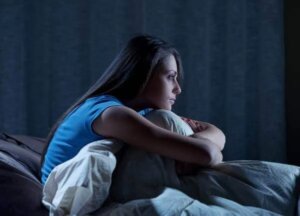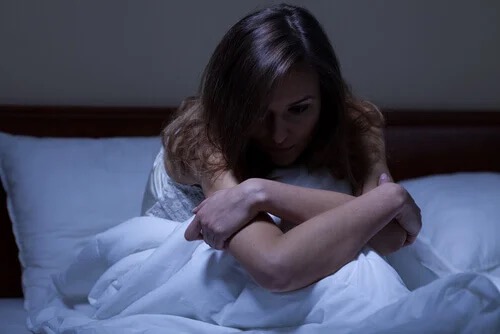Dyssomnias: Primary Sleep Disorders

We class dyssomnias as sleep disorders that can’t be attributed to any underlying medical condition. Undoubtedly, you’ve experienced sleeplessness at some point. Therefore, you know how important getting a good night’s sleep is.
Sleep is a fundamental biological process. Many of your most complex cognitive functions depend on it.
In fact, sleep is such a basic necessity that experts associate a lack of it with impaired cognitive performance. Furthermore, today’s lifestyle has been shown to greatly increase incidences of sleep disorders. Consequently, doctors have seen a rise in medical consultations for these conditions.

More than just a bad night’s sleep
Doctors define main sleep disorders as those not associated with any particular medical condition. These disorders are characterized by problems with:
- Sleep onset. Disorders like insomnia. This means you can’t fall asleep.
- Sleep maintenance. Disorders that mean you can’t stay asleep and you wake up intermittently.
- Excess sleep. Disorders like hypersomnia. This means you sleep excessively.
Alongside dyssomnias are parasomnias. These are disrupted states of sleep where there’s a worsening of both the quality and quantity of rest. Doctors also include these psychologically caused sleep disorders within the category of dyssomnias.
Types of dyssomnias
Dyssomnias form an extensive category, encompassing many different conditions.
There are some psychological, environmental, and organic factors that are potentially harmful to rest. When any such factors occur, you might experience problems relating to sleep duration and quality in a number of ways. These could be:
- Disorders of sleep onset and maintenance.
- Disorders of sleep quantity and quality.
Dyssomnias of sleep onset and maintenance
Insomnia is the most common of these disorders. Basically, insomnia means you struggle to fall asleep or stay asleep. In fact, you may not be able to do either.
These disorders become particularly severe if you don’t treat them. Furthermore, they negatively impact your daily life.
Some of the most common symptoms are:
- Insomnia. A state of psychological and physiological activation prevents sleep. You want to sleep but you’re unable to. This is because your body can’t sufficiently relax to fall asleep.
- Intermittent awakening or shallow sleep. An inability to achieve deep sleep (NREM). This is the kind of sleep that restores you. Therefore, if you don’t achieve it, you feel sleepy in the daytime.
Dyssomnias of sleep quality and quantity
Disturbances in quality and quantity of sleep occur when you sleep either less than normal or excessively. In addition, you usually experience poor quality of sleep. Also included here are parasomnias like sleepwalking or sleep paralysis.
Another example is hypersomnia. With this condition, you sleep excessively. Furthermore, you sleep in an unsynchronized manner, which can also be detrimental to your health.
Circadian rhythm disturbances
These dyssomnias occur when there’s an imbalance in your circadian rhythm. This is your basic biological cycle. It tells you when and how to sleep. It’s based on biological markers such as light/dark and temperature.
Jet lag is one example of a disruption to the circadian rhythm. When you suffer this, you experience a general imbalance in most of your functions.
How are dyssomnias detected?
Symptoms tend to sneak up on you. Of course, everyone has a bad night now and then. However, dyssomnias occur when you’re continually unable to sleep. Furthermore, they cause disabling effects.
Your nervous system will try to adapt to the situation. Then, when it gets used to the malfunction, you find yourself in a vicious cycle that can be really hard to break.
Take action
Usually, those closest to you notice these problems. Because when you’re not properly rested, you can’t function properly.
- Act fast. As soon as you suffer any deterioration in your sleep, consult a doctor.
- Get a referral to a specialist. Firstly, consult your GP. They may refer you to a psychologist, neurologist, or pulmonologist, among others. This will depend on the cause of the disorder.
- Detection tools. The main screening tests are clinical interviews and standardized psychometric tests. These might be daytime sleepiness tests and polysomnographic studies.

Treatment for dyssomnias
Treatment varies. It depends on the etiology of the disorder. Specialists often recommend a behavioral response to stimulus modification therapies.
Psychoeducation is extremely important. You need to learn the basics of good sleep practice. For example, avoiding any stimulants or stressful situations before bed.
Dyssomnias can coexist with other organic problems. For this reason, a psychologist might not be the main professional involved in any treatment. In fact, a whole team of medical specialists might be involved.
Once your body gets used to functioning in this way, you might find it quite difficult to return to normal. Therefore, you must address the problem as early as possible for any treatment to be successful.
This text is provided for informational purposes only and does not replace consultation with a professional. If in doubt, consult your specialist.








